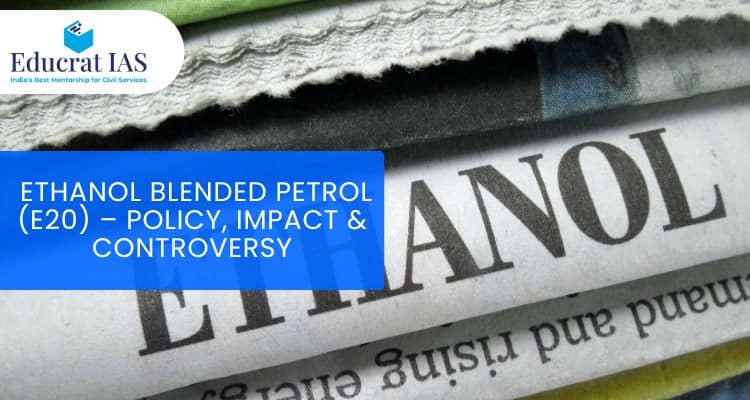India has been making significant strides toward sustainable energy and reducing its dependence on fossil fuels. One of the most talked-about initiatives is the Ethanol Blended Petrol (E20) programme. With India achieving 20% ethanol blending ahead of its 2030 target, this initiative has become a hot topic for policymakers, automobile industries, environmentalists, and UPSC aspirants. In this blog, we explore the policy, its impacts, controversies, and answer the most common questions around E20 petrol.
What is Ethanol Blended Petrol (E20)?
Ethanol Blended Petrol (E20) is a fuel containing 20% ethanol and 80% petrol. Ethanol is a biofuel derived mainly from sugarcane and grains. It is blended with petrol to reduce carbon emissions and decrease India’s reliance on imported fossil fuels.
The E20 programme is part of India’s broader National Bio-Energy Mission. India first started ethanol blending in 2003 with a modest 5–10% target, progressively increasing the blending percentage to reach 20% ethanol in 2025, marking a major step toward energy security and environmental sustainability.
Why E20 Petrol Matters
The E20 programme has wide-ranging implications for India’s economy, environment, and agriculture.
1. Environmental Benefits
Ethanol burns cleaner than petrol, releasing fewer pollutants such as carbon monoxide and particulate matter. This makes E20 an effective tool to reduce greenhouse gas emissions and improve air quality in urban areas.
2. Energy Security
India imports a large portion of its crude oil. By replacing a fraction of petrol with domestically produced ethanol, E20 helps save foreign exchange and enhances energy independence.
3. Agricultural Growth
Ethanol production supports sugarcane farmers and boosts rural employment. It also stabilizes sugar prices by creating an alternative market for surplus sugar production.
4. Technological Advancements
The rollout of E20 encourages research in engine compatibility, fuel efficiency, and biofuel production technologies, fostering innovation in India’s energy and automobile sectors.
Controversies and Challenges
Despite its advantages, E20 has faced criticism and legal challenges:
1. Engine Compatibility
Many vehicle owners worry that older engines may not handle E20 efficiently. Potential risks include reduced performance and long-term engine damage.
2. Fuel Efficiency
Ethanol-blended petrol may reduce fuel efficiency by 2–5%, depending on engine type. While environmentally friendly, this has raised concerns about cost-effectiveness for consumers.
3. Public Interest Litigation (PIL)
A PIL has been filed in the Supreme Court, challenging the nationwide rollout of E20. Petitioners argue that engine failures, economic burden on vehicle owners, and lack of awareness justify re-evaluating the policy.
4. Supply and Pricing Challenges
Ethanol production depends heavily on sugarcane availability, which can fluctuate due to weather patterns, affecting supply consistency and pricing.
Government’s Response
The government has taken steps to address these concerns:
- Conducting rigorous vehicle testing for E20 compatibility.
- Launching awareness campaigns for consumers and fuel station operators.
- Providing financial incentives for ethanol producers to ensure stable supply.
- Collaborating with automobile manufacturers to certify vehicles compatible with E20.
These steps demonstrate a balance between environmental goals and practical implementation.
UPSC Relevance
E20 petrol is highly relevant for UPSC preparation:
- GS Paper 3: Energy security, sustainable fuel, climate change mitigation.
- Prelims: Key facts about E20, blending percentages, and government policies.
- Mains: Analytical questions on policy impact, implementation challenges, and economic implications for agriculture and energy sectors.
A potential mains question could be: “Discuss the benefits and challenges of E20 ethanol-blended petrol in India. How does it contribute to sustainable development goals?”
Frequently Asked Questions (FAQ)
Q1. What is the main purpose of E20 petrol?
The main purpose is to reduce dependence on imported fossil fuels, lower carbon emissions, and promote sustainable biofuels.
Q2. How is ethanol produced in India for E20?
Ethanol is primarily produced from sugarcane, grains, and other biomass through fermentation and distillation processes.
Q3. Can all vehicles use E20 petrol?
No. Newer vehicles are generally compatible, but older vehicles may face engine issues. Consumers should check manufacturer guidelines.
Q4. What are the environmental benefits of E20?
E20 reduces greenhouse gas emissions, particulate matter, and harmful pollutants, improving air quality and contributing to climate change mitigation.
Q5. Why is there controversy around E20?
The controversy stems from engine compatibility concerns, fuel efficiency reduction, legal challenges (PILs), and fluctuating supply due to agricultural factors.
Conclusion
The Ethanol Blended Petrol (E20) programme represents a major step in India’s journey toward sustainable energy. While it offers clear environmental, economic, and agricultural benefits, it also faces challenges in implementation, engine compatibility, and public perception. Understanding E20 is not only crucial for UPSC aspirants but also helps citizens appreciate the complex interplay between policy, technology, and society in India’s energy landscape.
Need help staying updated? Let’s make it easier. Call us today at +91 91473 88921 or explore our Current Affairs Programs designed specifically for UPSC aspirants in Kolkata and nearby areas.
Stay informed. Stay confident. Stay ahead with Educrat IAS.





